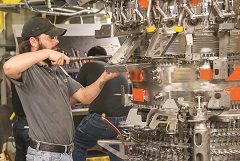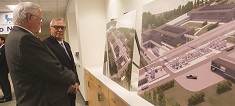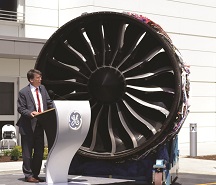

It takes continued commitment and innovation to foster business success. Both are evident in the state’s performance in objective rankings of its business operating costs, tax climate, workforce, educational and logistical resources and more. Here is a look at a few of the state’s business rankings and assets and how North Carolina continues to build on its strengths.
Affordable Operation and Labor Costs
North Carolina’s cost-effective business environment is clear in measures including electricity costs (which run nine percent less than the national average), office lease and construction expenses, unionization rate (the second-lowest in the nation) and overall cost of living.
North Carolina is No. 2 on Forbes’ 10th annual list of best states for business and careers, which ranks states based on their business costs, labor supply, regulatory environment, economic climate, growth prospects and quality of life. North Carolina is the only one that has appeared among the top five every year of the study.
The Forbes’ assessment most heavily weighs business costs, which include labor, energy and taxes. North Carolina’s labor costs are 10 percent below the national average and the fifth-lowest in the U.S., according to Moody Analytics data cited by Forbes.
Comparing costs between major cities in North Carolina and other states can lead to dramatic results. For example, biotechnology firms can rent lab space in North Carolina’s Raleigh-Durham area (a.k.a. the Triangle) for $19 per square foot on average versus $47.40 in Greater Boston or $37.30 in San Francisco, according to global real estate firm Jones Lang Lasalle (JLL).

And that less-costly space is available in the second-leading life science hub among the nation’s major metro areas, according to JLL’s 2015 Life Sciences Outlook report. The report’s ranking is based on life science employment concentration and growth, company concentration, venture capital funding, National Institutes of Health funding and patent activity. The Triangle, with its world-class companies, top-tier research universities and high quality of life, is behind only Greater Boston in JLL’s ranking.
Business-Friendly Tax Climate
Since passing a major tax overhaul in 2013, North Carolina lawmakers have slashed the state’s corporate income tax rate from 6.9 percent to four percent, the lowest rate among all 44 states with the tax. The statehas also moved from a tiered personal income tax with a top rate of 7.75 percent to a flat 5.75 percent rate, which will drop to 5.499 percent next year.
Over two years, North Carolina’s still unfolding tax overhaul has catapulted the state from 44th to 15th place in the Tax Foundation’s prominent ranking of business tax climates in all 50 states. A further rise in the ranks may come. The corporate income tax rate will drop to three percent in 2017, if revenue triggers are met.
Lawmakers have also recently adopted a new formula for calculating corporate income tax liability. This year, North Carolina began phasing-in the “single sales factor” method. By 2018, the state will apportion business income based solely on a company’s sales located in or sourced to North Carolina. The formula will no longer consider a company’s payroll or property in the state. The shift benefits multi-state corporations interested in building new facilities or expanding hiring in North Carolina.

Bolstered Incentives
In 2015, legislators significantly increased state funding available for a major state incentive program, the Job Development Investment Grant (JDIG). The JDIG incentive provides annual tax rebates to qualified companies that meet hiring and investment commitments made as part of relocation or expansion projects in North Carolina.
Lawmakers raised the limit on JDIG grants the state can give each year by 33 percent. The new cap increases by another 75 percent if the state lands a so-called “high-yield” project that will create at least 1,750 new jobs and invest at least $500 million in North Carolina.
The monetary value of JDIG grants is based on a percentage of personal income tax withholdings associated with new jobs a company expansion creates. A “high-yield” project that consistently meets all of its job-creation and other JDIG obligations can receive grants worth up to 100 percent of withholdings for up to 20 years rather than the standard 80 percent and 12 years.
The JDIG changes target bringing a new large-scale manufacturer, such as auto assembly plant, to North Carolina, which already has a very strong automotive industry presence. Thirty-four of the top 150 automotive parts manufacturers in North America have operations in North Carolina, and 19 of those have more than one facility in the state. The state is also home to the largest heavy-duty truck manufacturing sector in the U.S.
Manufacturing Welcome
North Carolina companies like to make things — so many, in fact, the state ranks first in the Southeastern U.S. and ninth nationally in total manufacturing employment. More than 462,000 people work for 10,000 manufacturing locations across the state.
North Carolina is also a leader in high-tech manufacturing businesses, such as biotechnology, pharmaceutical, computer and electronics, automotive and aerospace. The state’s advanced manufacturers include Denmark-based Novo Nordisk, which recently announced plans to build a $1.2 billion-plus biomanufacturing facility in Clayton, North Carolina, that will create nearly 700 new jobs and help the global drugmaker meet growing demand for its diabetes treatments.

Overall, North Carolina’s manufacturing industry employment has grown by more than six percent since 2011. Individual sectors such as automotive manufacturing and aerospace and aviation manufacturing are increasing at much higher rates. For example, the number of people working for North Carolina’s aerospace products and parts manufacturers has risen 30 percent over the past five years, now totaling 5,500 people, even as employment in that area declined nationwide.
The state’s aerospace industry includes high-profile companies such as GE Aviation, Honda Aircraft, Curtiss-Wright, Northrop Grumman and Spirit AeroSystems. And many are pursuing major expansions and making cutting-edge products in North Carolina.
For example, Honda Aircraft Co. received final federal approval late last year for the HondaJet, an innovative advanced light jet with an over-the-wing engine mount produced at the company’s world headquarters in Greensboro, North Carolina, which employs more than 1,300 people. Also in 2015, GE Aviation completed a $65 million expansion of its West Jefferson machining factory, whose growing workforce will help the company meet record demand for its new joint-venture, highly fuel-efficient LEAP commercial jet engine.
To keep up with the demand, GE has partnered with Wilkes Community College in a program that provides hands-on training for current and prospective employees on state-of-the-art machinery. It’s only one example of how advanced manufacturing companies partner with schools throughout the state’s 58-campus community college system for workforce development customized to an employer’s most pressing needs.
“North Carolina is extremely well-positioned to meet the needs of new and growing advanced manufacturing enterprises,” said Christopher Chung, chief executive officer of the Economic Development Partnership of North Carolina, which markets the state for business and tourism.

